Adam Grant is an organizational psychologist, professor, and best-selling author known for his expertise in the fields of work and motivation. Born on August 13, 1981, in West Bloomfield, Michigan, Grant has made significant contributions to understanding human behavior in the workplace. As a professor at the Wharton School of the University of Pennsylvania, Adam Grant has gained widespread recognition for his research and teachings on topics such as organizational behavior, motivation, and the psychology of success. He is renowned for his dynamic and engaging approach to teaching, earning accolades for his ability to make complex concepts accessible to a broad audience. Grant's work extends beyond academia, as he has authored several influential books.
Notably, "Give and Take" explores the dynamics of reciprocity in the workplace, arguing that individuals who give without expecting immediate returns often achieve long-term success.
Another notable work, "Originals," delves into the habits and thought processes that foster creativity and innovation. Adam Grant's insights have earned him a reputation as a thought leader, and he has been recognized by numerous prestigious awards for his contributions to the field. His ability to blend academic rigor with practical applications has made him a sought-after speaker and advisor for organizations seeking to enhance their workplace dynamics and foster innovation.
Adam Grant Books:
Give and Take: Why Helping Others Drives Our Success
"Give and Take: A Revolutionary Approach to Success" by Adam Grant is a thought-provoking book that challenges traditional notions of success by exploring the dynamics of giving, taking, and matching in various aspects of life. Grant presents compelling stories and research to support his argument that givers, contrary to popular belief, often achieve the most success. The book has received both praise and criticism, with some readers finding it engaging and inspiring, while others have found certain parts to be less captivating.
Bobby Powers, in his review on bobbypowers.net, lauds the book as "engaging, research-based, and artfully told," giving it a perfect 10 out of 10 rating. He highlights the compelling stories and surprising data presented by Grant, emphasizing the inspiring conclusions drawn in the book [2].
The Financial Times describes the book as "engaging, intriguing, and filled with surprising success stories," and praises Grant for challenging the "me first" worldview, offering a new model for relationships in the workplace. The review commends the book for being "perfectly timed and beautifully weighted," and for crushing the assumption that "me-first takers always reach the top of the ladder" [3].
On the other hand, a review on Goodreads by Aramide Salako expresses a different perspective, stating that the book became boring and failed to maintain the initial intrigue. The review acknowledges the central concept of the book, which is that givers tend to benefit more from their actions than takers or matchers, but criticizes the book for not sustaining the reader's interest [1].
Overall, "Give and Take" has been praised for its fresh perspective on success and its well-supported arguments. While some readers may find certain parts less engaging, the book has generally been well-received for its thought-provoking content and real-world examples. Whether you are a business professional, a student, or someone interested in human behavior, "Give and Take" offers valuable insights into the dynamics of success and relationships.
Think Again: The Power of Knowing What You Don't Know 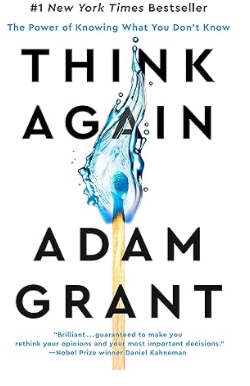
Adam Grant's "Think Again" has received widespread acclaim for its thought-provoking content and practical insights. The book encourages readers to question what they know, resist giving advice too quickly, and exhibit humility. Grant emphasizes the importance of intellectual curiosity and confident humility in approaching conversations and debates, urging individuals to reexamine their viewpoints and remain open to learning from others [2] [4].
Hidden Potential: The Science of Achieving Greater Things
Adam Grant's "Hidden Potential: The Science of Achieving Greater Things" is a compelling exploration of the science of success and the strategies to unlock one's hidden potential. The book, published in October 2023, has garnered significant praise for its insightful content and practical advice. Grant weaves together groundbreaking evidence, surprising insights, and vivid storytelling, taking the reader from the classroom to the boardroom, and beyond.
The book delves into the concept of hidden potential, emphasizing the importance of character development, adaptability, and strength of character in achieving greater things. Grant challenges the common emphasis on innate ability, arguing that internal drive and work ethic play a more significant role in success. He provides practical guidance on fostering character skills such as proactivity, discipline, and determination, highlighting the value of embracing discomfort, making mistakes, and learning from failure [3] [4].
"Hidden Potential" has been well-received by readers, with many praising Grant's ability to deliver contemporary and personal insights. The book's focus on scaffolding, character development, and identifying hidden potential has resonated with individuals seeking to maximize their own growth and support the development of those around them [2] [3].
While the book has received widespread acclaim, some reviewers have expressed a desire for Grant to shift his focus from the individual to the organization in his future work. They suggest that analyzing and explaining the role of organizations in unlocking hidden potential could be a valuable area for exploration. Additionally, there is a call for Grant to consider writing a book specifically focused on higher education, given his expertise and the potential impact of such a work [1].
Originals: How Non-Conformists Move the World
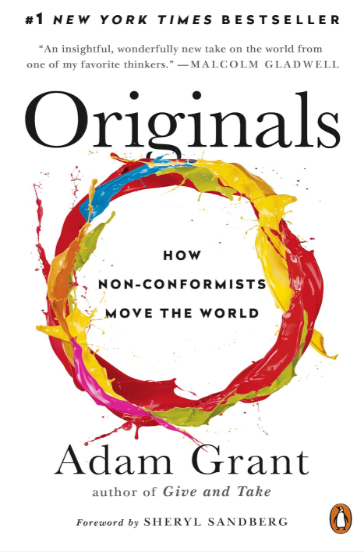 Adam Grant's "Originals: How Non-Conformists Move the World" is a thought-provoking book that delves into the qualities of original people, the generation and communication of original ideas, and the impact of originality on various aspects of life. The book is a compelling read for anyone interested in fostering creativity, challenging the status quo, and making a meaningful impact. Grant's use of research, studies, and real-life examples makes the book engaging and informative, offering valuable insights into the nature of originality and its significance in today's world.
Adam Grant's "Originals: How Non-Conformists Move the World" is a thought-provoking book that delves into the qualities of original people, the generation and communication of original ideas, and the impact of originality on various aspects of life. The book is a compelling read for anyone interested in fostering creativity, challenging the status quo, and making a meaningful impact. Grant's use of research, studies, and real-life examples makes the book engaging and informative, offering valuable insights into the nature of originality and its significance in today's world.
The book presents a compelling argument for the importance of original thinking and behavior, and it challenges common assumptions about creativity and non-conformity. Grant's exploration of how originality can be nurtured from childhood and its relevance to various fields, including business, entrepreneurship, and social movements, makes "Originals" a versatile and enlightening read for a wide audience. The author's engaging writing style and use of fascinating stories, research, and case studies further enhance the book's appeal.
While "Originals" has received widespread acclaim for its valuable insights, it has also sparked some debate. Some readers have raised concerns about the book's focus on business, entrepreneurship, and inventors, wishing for a broader exploration of originality in other domains such as arts, literature, and everyday life. However, the book's relevance to a diverse range of fields and its potential to inspire individuals to embrace original thinking and action remain significant strengths.
Here is an excerpt:
"One great study looked at two groups. The first group was a group of scientists and researchers that were at the top of their field, working for world-leading organisations, do groundbreaking work, making cutting-edge discoveries and publishing their findings around the world. The other group were scientists and researchers who were ever-so-slightly above the first group: they were at the top of their field, working for world-leading organisations, do groundbreaking work, making cutting-edge discoveries and publishing their findings around the world, AND they won the Nobel Prize. The study compared the Nobel Prize winning scientists from 1901 to 2005 to their equivalent peers that seemed oh-so-close but didn’t win the Nobel Prize. The study sought to identify some skill or trait or approach that set the Nobel Prize winners apart and took their work to the next level.
You might assume that those who won the Nobel Prize worked harder. You might assume that they spent more hours in the lab and more hours doing research. But instead they found that, almost paradoxically, this wasn’t the case at all.
Compared to their almost-top-of-their-field peers, the Nobel Prize winners were:
– 2x more likely to be involved in music (play an instrument, compose, conduct)
– 7x more likely to engage in art (drawing, painting, sculpting)
– 7.5x more likely to do crafts (woodwork, mechanics, electronics, glassblowing)
– 12x more likely to write (poetry, plays, novels, short stories, essays, popular books)
– 22x more likely to do performances (acting, dancing, magic)
If you want to be a world-leading scientist, you might question how that one extra free hour in your week is spent. Should you go and sit down at your desk for an extra hour, or should you sit down at the piano instead?
In any study like this, we need to be wary of correlation and causation. Just because two things go together statistically doesn’t necessarily mean that one leads to the other."
Which of Adam Grant's books is next on your reading list?


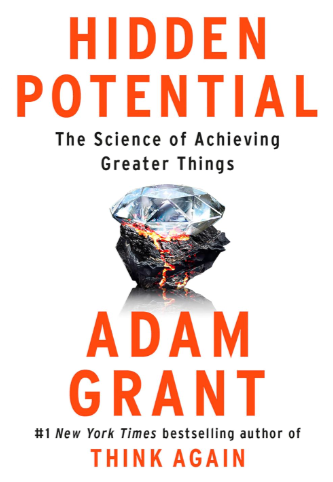
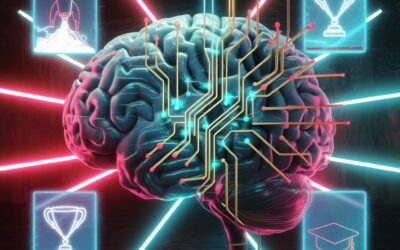
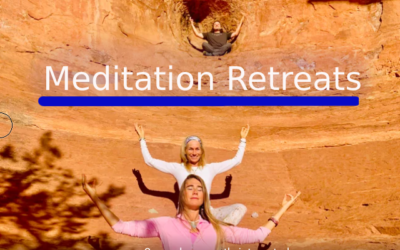


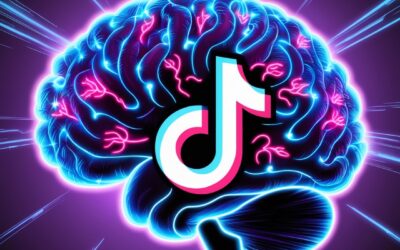

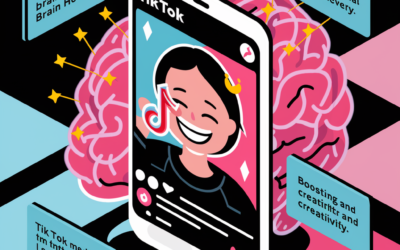
















0 Comments